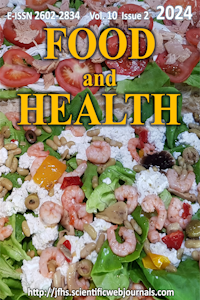Abstract
As students transition from family homes to university life, they make autonomous decisions, including dietary choices. This phase plays a crucial role in the formation of their eating habits. The research was conducted between February and May 2023, with 430 university students included. Survey questions were applied to the participants to evaluate their socio-demographic characteristics, eating habits, and food consumption. Their food preferences and tendency towards food obsession depending on their living environment were assessed using the "Power Food Scale". The mean age of the participants was 21.0 ±2.67, and the mean body mass index was 21.3 ±3.03 kg/m2. The findings revealed that 32.5% of the participants resided with their families, whereas 45.4% were accommodated in dormitories. A statistically significant difference was stated in the frequency of meat products, legumes, pasta, rice, fruit, and vegetable consumption among university students based on their residence (p<0.05). It was determined that the other food preferences questioned by the participants did not have a statistically significant effect on the accommodation environment (p>0.05). The mean nutritional power of the students participating in the research was 2.95 ±0.74. In other words, it has been determined that they are sensitive to foods containing delicious foods. This study can inform the development of targeted strategies to analyse university students' eating habits, address unhealthy eating, and promote better health.
Ethical Statement
The study received approval from the Afyonkarahisar Health Sciences University Non-Interventional Clinical Research Ethics Committee during meeting number 2023/1 on January 6, 2023.
References
- Arslan, M., Yabancı Ayhan, N., Çolak, H., Sarıyer, E.T., Çevik, E. (2023). Evaluation of the effect of hedonic hunger on nutrition change processes and its relationship with BMI: A study on university students. Clinical and Experimental Health Sciences, 13(2), 234-42. https://doi.org/10.33808/clinexphealthsci.1178208
- Beerman, K.A., Jennings, G., Crawford, S. (1990). The effect of student residence on food choice. Journal of the American College Health Association, 38(5), 215-220. https://doi.org/10.1080/07448481.1990.9936190
- Burger, K.S., Abigail J.S., Gilbert J.R. (2016). Hedonic hunger is related to increased neural and perceptual responses to cues of palatable food and motivation to consume: Evidence from 3 independent investigations. Journal of Nutrition, 146(9), 1807-1812. https://doi.org/10.3945/jn.116.231431
- Bülbül, A., Doğuer, Ç. (2022). Yetişkinlerde Hedonik açlık durumunun sosyal medya bağımlılığı ve obezite ile ilişkisinin araştırılması. İstanbul Gelişim Üniversitesi Sağlık Bilimleri Dergisi, 16, 87-97. https://doi.org/10.38079/igusabder.1077728
- Deric, D.H., Godfrey, E., Quaicoe, O. (2017). Food sources and preferences of college students. European Scientific Journal, September, 7-8. https://doi.org/10.19044/esj.2017.c1p7
- El Ansari, W., Stock, C., Mikolajczyk, R.T. (2012). Relationships between food consumption and living arrangements among university students in four European countries - A cross-sectional study. Nutrition Journal, 11(1), 1-7. https://doi.org/10.1186/1475-2891-11-28
- Harker, D., Sharma, B., Harker, M., Reinhard, K. (2010). Leaving home: Food choice behavior of young German adults. Journal of Business Research, 63(2), 111–115. https://doi.org/10.1016/j.jbusres.2009.02.007
- Hayzaran, M. (2018). Üniversite Öğrencilerinin hedonik açlik durumlarinin farkli ölçekler ile belirlenmesi [Başkent University, Institute of Health Sciences, Department of Nutrition and Dietetics. Master’s Thesis].
- Hekimci, F. (2007). Tüketici Bilincinin Milli Ekonomiye Katkıları. Verimlilik Dergisi, 3 111-130.
- Karakaş, H.M., Saka, M. (2021). Obez olan ve olmayan yetişkin bireylerde sezgisel yeme davranışının hedonik açlık ve aşırı besin isteği ile ilişkisinin belirlenmesi. Başkent Üniversitesi Sağlık Bilimleri Fakültesi Dergisi, 6, 53-69.
- Li, X., Braakhuis, A., Li, Z., Roy, R. (2022). How does the university food environment impact student dietary behaviors? A systematic review. Frontiers in Nutrition, 9(April). https://doi.org/10.3389/fnut.2022.840818
- Lowe, M.R., Butryn, M.L. (2007). Hedonic hunger: A new dimension of appetite? Physiology and Behavior, 91(4), 432-439. https://doi.org/10.1016/j.physbeh.2007.04.006
- Lowe, M.R., Butryn, M.L., Didie, E.R., Annunziato, R.A., Thomas, J.G., Crerand, C.E., Ochner, C.N., Coletta, M.C., Bellace, D., Wallaert, M., Halford, J. (2009). The Power of Food Scale. A new measure of the psychological influence of the food environment. Appetite, 53(1), 114-118. https://doi.org/10.1016/j.appet.2009.05.016
- Marquis, M. (2005). Exploring convenience orientation as a food motivation for college students living in residence halls. International Journal of Consumer Studies, 29(1), 55-63. https://doi.org/10.1111/j.1470-6431.2005.00375.x
- Martínez Álvarez, J.R., García Alcón, R., Villarino Marín, A., Marrodán Serrano, M.D., Serrano Morago, L. (2015). Eating habits and preferences among the student population of the Complutense University of Madrid. Public Health Nutrition, 18(14), 2654-2659. https://doi.org/10.1017/S1368980015000026
- Piggford, T., Raciti, M., Harker, D., Harker, M. (2008). The influence of residence on young adult attitudes toward healthy eating. Social Marketing Quarterly, 14(2), 33-49. https://doi.org/10.1080/15245000802034689
- Ryan, D., Holmes, M., Ensaff, H. (2022). Adolescents’ dietary behaviour: The interplay between home and school food environments. Appetite, 175(January). https://doi.org/10.1016/j.appet.2022.106056
- Sonkaya, Z.İ., Balcı, E., Ayar, A. (2018). Üniversite öğrencilerinin gıda okuryazarlığı ve gıda güvenliği konusunda bilgi, tutum ve davranışları “Amasya Üniversitesi Sabuncuoğlu Şerefeddin Sağlık. Türk Hijyen ve Deneysel Biyoloji Dergisi, 75(1), 53-64.
- SSC. (2023). Sample size calculator. Creative Research Sys-tems survey software. https://www.surveysystem.com/sscalc.htm (accessed 22.12.2022)
- TÜBER. (2022). T.C. Sağlık Bakanlığı Halk Sağlığı Genel Müdürlüğü Türkiye Beslenme Rehberi, Ankara, 430.
- WHO. (2023). World Health Organization. Obesity: Preventing and Managing the Global Epidemic. https://www.who.int/news-room/fact-sheets/detail/obesity-and-overweight (accessed 15.04.2023)
- Ulker, I., Ayyildiz, F., Yildiran, H. (2021). Validation of the Turkish version of the power of food scale in adult population. Eating and Weight Disorders, 26(4), 1179-1186. https://doi.org/10.1007/s40519-020-01019-x
- Yılmaz, C.S., Saka, M. (2019). Yetişkin profesyonel erkek futbolcuların hedonik açlık ve beslenme durumlarının belirlenmesi. Journal of Nutrition and Dietetics, 47(2), 1-10. https://doi.org/10.33076/0.BDD.1031
- YÖK. (2023). 2022-2023 eğitim öğretim yılı verileri. Yükseköğretim Kurumu, https://www.yok.gov.tr/Sayfalar/Haberler/2023/yuksekogretimde-yeni-istatistikler (accessed 22.12.2022)
Abstract
References
- Arslan, M., Yabancı Ayhan, N., Çolak, H., Sarıyer, E.T., Çevik, E. (2023). Evaluation of the effect of hedonic hunger on nutrition change processes and its relationship with BMI: A study on university students. Clinical and Experimental Health Sciences, 13(2), 234-42. https://doi.org/10.33808/clinexphealthsci.1178208
- Beerman, K.A., Jennings, G., Crawford, S. (1990). The effect of student residence on food choice. Journal of the American College Health Association, 38(5), 215-220. https://doi.org/10.1080/07448481.1990.9936190
- Burger, K.S., Abigail J.S., Gilbert J.R. (2016). Hedonic hunger is related to increased neural and perceptual responses to cues of palatable food and motivation to consume: Evidence from 3 independent investigations. Journal of Nutrition, 146(9), 1807-1812. https://doi.org/10.3945/jn.116.231431
- Bülbül, A., Doğuer, Ç. (2022). Yetişkinlerde Hedonik açlık durumunun sosyal medya bağımlılığı ve obezite ile ilişkisinin araştırılması. İstanbul Gelişim Üniversitesi Sağlık Bilimleri Dergisi, 16, 87-97. https://doi.org/10.38079/igusabder.1077728
- Deric, D.H., Godfrey, E., Quaicoe, O. (2017). Food sources and preferences of college students. European Scientific Journal, September, 7-8. https://doi.org/10.19044/esj.2017.c1p7
- El Ansari, W., Stock, C., Mikolajczyk, R.T. (2012). Relationships between food consumption and living arrangements among university students in four European countries - A cross-sectional study. Nutrition Journal, 11(1), 1-7. https://doi.org/10.1186/1475-2891-11-28
- Harker, D., Sharma, B., Harker, M., Reinhard, K. (2010). Leaving home: Food choice behavior of young German adults. Journal of Business Research, 63(2), 111–115. https://doi.org/10.1016/j.jbusres.2009.02.007
- Hayzaran, M. (2018). Üniversite Öğrencilerinin hedonik açlik durumlarinin farkli ölçekler ile belirlenmesi [Başkent University, Institute of Health Sciences, Department of Nutrition and Dietetics. Master’s Thesis].
- Hekimci, F. (2007). Tüketici Bilincinin Milli Ekonomiye Katkıları. Verimlilik Dergisi, 3 111-130.
- Karakaş, H.M., Saka, M. (2021). Obez olan ve olmayan yetişkin bireylerde sezgisel yeme davranışının hedonik açlık ve aşırı besin isteği ile ilişkisinin belirlenmesi. Başkent Üniversitesi Sağlık Bilimleri Fakültesi Dergisi, 6, 53-69.
- Li, X., Braakhuis, A., Li, Z., Roy, R. (2022). How does the university food environment impact student dietary behaviors? A systematic review. Frontiers in Nutrition, 9(April). https://doi.org/10.3389/fnut.2022.840818
- Lowe, M.R., Butryn, M.L. (2007). Hedonic hunger: A new dimension of appetite? Physiology and Behavior, 91(4), 432-439. https://doi.org/10.1016/j.physbeh.2007.04.006
- Lowe, M.R., Butryn, M.L., Didie, E.R., Annunziato, R.A., Thomas, J.G., Crerand, C.E., Ochner, C.N., Coletta, M.C., Bellace, D., Wallaert, M., Halford, J. (2009). The Power of Food Scale. A new measure of the psychological influence of the food environment. Appetite, 53(1), 114-118. https://doi.org/10.1016/j.appet.2009.05.016
- Marquis, M. (2005). Exploring convenience orientation as a food motivation for college students living in residence halls. International Journal of Consumer Studies, 29(1), 55-63. https://doi.org/10.1111/j.1470-6431.2005.00375.x
- Martínez Álvarez, J.R., García Alcón, R., Villarino Marín, A., Marrodán Serrano, M.D., Serrano Morago, L. (2015). Eating habits and preferences among the student population of the Complutense University of Madrid. Public Health Nutrition, 18(14), 2654-2659. https://doi.org/10.1017/S1368980015000026
- Piggford, T., Raciti, M., Harker, D., Harker, M. (2008). The influence of residence on young adult attitudes toward healthy eating. Social Marketing Quarterly, 14(2), 33-49. https://doi.org/10.1080/15245000802034689
- Ryan, D., Holmes, M., Ensaff, H. (2022). Adolescents’ dietary behaviour: The interplay between home and school food environments. Appetite, 175(January). https://doi.org/10.1016/j.appet.2022.106056
- Sonkaya, Z.İ., Balcı, E., Ayar, A. (2018). Üniversite öğrencilerinin gıda okuryazarlığı ve gıda güvenliği konusunda bilgi, tutum ve davranışları “Amasya Üniversitesi Sabuncuoğlu Şerefeddin Sağlık. Türk Hijyen ve Deneysel Biyoloji Dergisi, 75(1), 53-64.
- SSC. (2023). Sample size calculator. Creative Research Sys-tems survey software. https://www.surveysystem.com/sscalc.htm (accessed 22.12.2022)
- TÜBER. (2022). T.C. Sağlık Bakanlığı Halk Sağlığı Genel Müdürlüğü Türkiye Beslenme Rehberi, Ankara, 430.
- WHO. (2023). World Health Organization. Obesity: Preventing and Managing the Global Epidemic. https://www.who.int/news-room/fact-sheets/detail/obesity-and-overweight (accessed 15.04.2023)
- Ulker, I., Ayyildiz, F., Yildiran, H. (2021). Validation of the Turkish version of the power of food scale in adult population. Eating and Weight Disorders, 26(4), 1179-1186. https://doi.org/10.1007/s40519-020-01019-x
- Yılmaz, C.S., Saka, M. (2019). Yetişkin profesyonel erkek futbolcuların hedonik açlık ve beslenme durumlarının belirlenmesi. Journal of Nutrition and Dietetics, 47(2), 1-10. https://doi.org/10.33076/0.BDD.1031
- YÖK. (2023). 2022-2023 eğitim öğretim yılı verileri. Yükseköğretim Kurumu, https://www.yok.gov.tr/Sayfalar/Haberler/2023/yuksekogretimde-yeni-istatistikler (accessed 22.12.2022)
Details
| Primary Language | English |
|---|---|
| Subjects | Nutrition and Dietetics (Other) |
| Journal Section | Research Articles |
| Authors | |
| Early Pub Date | April 1, 2024 |
| Publication Date | April 3, 2024 |
| Submission Date | October 4, 2023 |
| Published in Issue | Year 2024Volume: 10 Issue: 2 |
Journal is licensed under a
CreativeCommons Attribtion-ShareAlike 4.0 International Licence 


Diamond Open Access refers to a scholarly publication model in which journals and platforms do not charge fees to either authors or readers.
Open Access Statement:
This is an open access journal which means that all content is freely available without charge to the user or his/her institution. Users are allowed to read, download, copy, distribute, print, search, or link to the full texts of the articles, or use them for any other lawful purpose, without asking prior permission from the publisher or the author. This is in accordance with the BOAI definition of open access.
Archiving Policy:
Archiving is done according to ULAKBİM "DergiPark" publication policy (LOCKSS).


